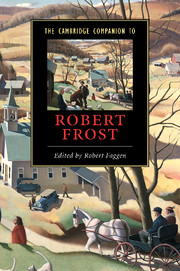Book contents
- Frontmatter
- Introduction
- 1 “Stay Unassuming”
- 2 Frost Biography and A Witness Tree
- 3 Frost and the Questions of Pastoral
- 4 Frost and the Ancient Muses
- 5 Frost as a New England Poet
- 6 “Across Spaces of the Footed Line”
- 7 Frost’s Poetry of Metaphor
- 8 Frost and the Meditative Lyric
- 9 Frost’s Poetics of Control
- 10 Frost’s Politics and the Cold War
- 11 “Synonymous with Kept”
- 12 Human Presence in Frost’s Universe
- Select bibliography
- Index
11 - “Synonymous with Kept”
Frost and Economics
Published online by Cambridge University Press: 28 May 2006
- Frontmatter
- Introduction
- 1 “Stay Unassuming”
- 2 Frost Biography and A Witness Tree
- 3 Frost and the Questions of Pastoral
- 4 Frost and the Ancient Muses
- 5 Frost as a New England Poet
- 6 “Across Spaces of the Footed Line”
- 7 Frost’s Poetry of Metaphor
- 8 Frost and the Meditative Lyric
- 9 Frost’s Poetics of Control
- 10 Frost’s Politics and the Cold War
- 11 “Synonymous with Kept”
- 12 Human Presence in Frost’s Universe
- Select bibliography
- Index
Summary
We live in an age of epistemes as decals: depthless, portable, easy to peel and carry off. Or so we think. Robert Frost did not. But his epistemes were not firmly anchored either. Here is an example. Frost rejects the gentility and aesthetic dandyism of his immediate predecessors (William Vaughn Moody, say, or Oscar Wilde). They, politely or with disdain, luxuriated in art's imposed or elected exemption from the commerce-based estimates of the Gilded Age. They rejected their culture's exaltation of values associated with industrial manufacture and market capitalism, technology and business - the values of utility and commodity - as ultimate standards of worth. Frost shared their doubt that commercial viability and usefulness alone could properly evaluate all things, but he differed from both genteel and art-for-art's-sake assumptions in taking it for granted that his culture's dominant values were real ones, with their own legitimate, if partial, claims on literature and life. Thus Frost's “realism” of subject matter and treatment, his culturally derived or driven recasting of supposedly feminine poetry as a form of manly prowess and competition, and his “commercial” insistence on “the trial by market everything [including poems] must come to” (CPPP, 845) seem to exist at a chill, even polar remove from Wilde's heated, anti-utilitarian faith that life imitates art. But the complications twist, then turn. Frost's passionate preference for Jamesian “wishful” thinking, his insistence that knowledge is metaphorical, his subtle but persistent intertextuality, his unmooring of meaning from fixity, and his pleasure in parodic appropriation all have a Wilde, postmodern savor.
- Type
- Chapter
- Information
- The Cambridge Companion to Robert Frost , pp. 241 - 260Publisher: Cambridge University PressPrint publication year: 2001
- 2
- Cited by

